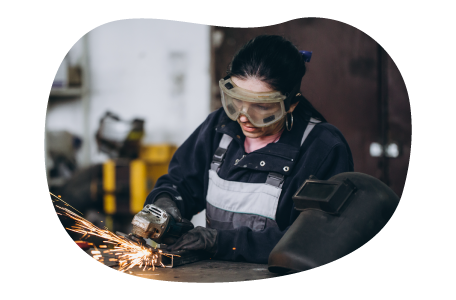
Why do welders need insurance?
You know how dangerous welding can be, which is why you need insurance. If an employee is injured from an electric shock or exposure to fumes, workers' comp covers their medical costs. Other policies pay for financial losses related to property damage, accidents, and accusations of negligence.

Find the right coverage
Insureon's licensed agents help welding contractors and businesses find property and liability coverage that matches their unique risks. Fill out our easy online application to compare quotes from top-rated providers.
Our expert agents will help you fulfill insurance requirements and get the right protection for your business.
What types of insurance do welding businesses need?
General liability insurance
This insurance covers third-party legal expenses, such as a lawsuit from a client who trips over your welding equipment and breaks an ankle. It may be required for a commercial lease or contract.
- Slip-and-fall accidents
- Damaged customer property
- Product liability insurance
Business owner's policy
A business owner's policy, or BOP, is an inexpensive way for welding businesses to buy general liability coverage and commercial property insurance together.
- Slip-and-fall injuries
- Accidental damage to client property
- Damage to your building or its contents
Workers’ compensation insurance
Most states require workers' comp for welding businesses that have employees. It also protects sole proprietors from work injury costs that health insurance might deny.
- Employee medical expenses
- Disability benefits
- Legal fees from workplace injuries
Commercial auto insurance
This policy covers bodily injuries and property damage caused by a mobile welder’s truck or other business vehicle. It also covers vandalism and weather damage.
- Physical damage and collision coverage
- Medical costs if another person is injured
- Vandalism and theft
Contractor’s tools and equipment insurance
This policy helps pay for repair or replacement of MIG welders, grinders, drills, and other tools if they are lost, stolen, or damaged. It's a type of inland marine insurance.
- Tools less than five years old
- Equipment valued at $10,000 or less
- Items brought to jobsites
Professional liability insurance
A professional liability insurance policy covers legal defense costs when a welding contractor is sued for a mistake or oversight. It's also called errors and omissions insurance (E&O).
- Accusations of negligence
- Failure to finish a project on time
- Failure to follow a blueprint
How much does business insurance cost for welders?

A welder who works alone will pay less for insurance than a welding shop with several employees.
Factors that affect your premiums include:
- Type of welding work, such as residential or commercial
- Business equipment and property
- Business size, location, and revenue
- Types of insurance purchased
- Policy limits and deductibles
- History of insurance claims
How do I get welder's insurance?
It’s easy to get welding insurance coverage and surety bonds if you have your business information on hand. Our insurance application will ask for basic facts about your business, such as revenue and number of employees. Small business owners can buy a policy online and get a certificate of insurance with Insureon in three easy steps:
- Complete a free online application
- Compare insurance quotes and choose policies
- Pay for your policy and download a certificate
Insureon's licensed agents work with top-rated U.S. insurance providers to find the most affordable coverage that fits your welding services, whether you do mobile welding or other types of work.
Verified business insurance reviews
Hear from customers like you who purchased small business insurance.
Common questions about welding business insurance
Review answers to common questions about welding insurance.
Do contractors and subcontractors need insurance?
Contractors and subcontractors take on many of the same risks as a larger business, and need insurance for many of the same reasons. For instance, welding contractor insurance may be required to sign a contract with a client, lease a commercial office, or secure a business loan.
Even when insurance isn't required, you'll still benefit from the financial protection it offers. Especially in a dangerous profession like welding, sole proprietors and subcontractors might want workers' comp in order to avoid paying costly medical bills that likely won't be covered by personal health insurance.
Finally, if you use your personal vehicle for business use, you might want additional coverage for the same reason. Your personal auto policy likely won't cover work-related driving, which is why contractors who drive personal, leased, or rented vehicles for work depend on hired and non-owned auto insurance (HNOA) for coverage.
How do I insure equipment that travels with me?
Commercial property insurance only covers your building and the items inside it. Small business owners can buy inland marine insurance to cover welding equipment brought to construction sites and other locations away from your office.
The most common type of inland marine insurance for welders is contractor's tools and equipment insurance, which covers newer items valued at less than $10,000. It'll protect your property wherever you bring it and while it's in transit.
Another type of inland marine coverage, installation floater insurance, covers materials being installed or built by a contractor during a project.
What other types of coverage might I need?
In addition to the policies mentioned above, welders should consider the following for their risk management plan:
- Builder's risk insurance: Builder's risk provides coverage for a structure under construction and materials at a work site. It's sometimes called course of construction insurance.
- Business personal property (BPP) coverage: You can add this endorsement to your general liability policy to protect business property kept at a designated location, though you may not have a building.
- Commercial umbrella insurance: Umbrella insurance boosts the coverage on your general liability, commercial auto, and employer's liability insurance once the policy limit is reached.
- Surety bonds: Welders sometimes need a surety bond to sign a contract with a client. A bond guarantees reimbursement if a welding contractor fails to deliver agreed-upon services.
